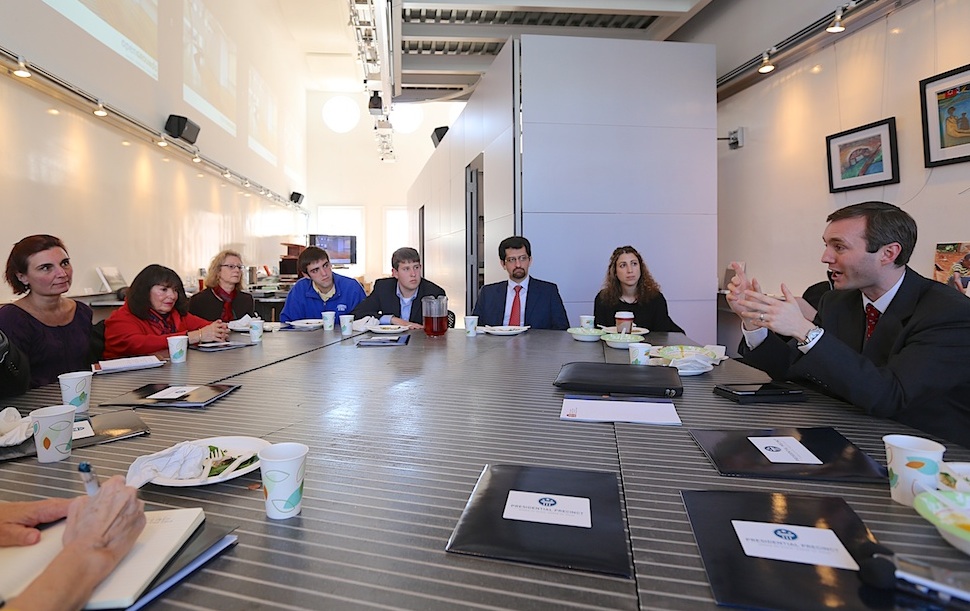The U.S. State Department is partnering with the University of Virginia on a national pilot program to help address “the extraordinary proliferation of complex challenges” facing U.S. diplomats in the 21st century.
“America’s diplomatic to-do list is growing rapidly; the number of people we have at the State Department to manage those priorities is not,” said Tomicah Tillemann, U.S. Secretary of State John Kerry’s senior adviser for civil society and emerging democracies. “We recognize the real need to reach out and build our … base for research and innovation; and in universities like U.Va. you have an extraordinary, but largely untapped, reservoir of world-class intellectual potential.”
To help shorten that to-do list, the State Department created the Diplomacy Lab and engaged U.Va. as well as William & Mary as the first two sites in the nation to participate in the pilot project, which will launch across the country next fall.
Tillemann’s colleagues helped hone a 16-item, unclassified “issues list” with which analysts need help. The projects range in topic from human trafficking to analyzing the effects of social media on women and children vulnerable to sexual or gender-based violence.
In addition to drawing upon students’ brainpower, he said, Diplomacy Lab will capitalize on their adeptness with new technologies. “We think this is a real, strategic boon for the State Department, that we get to tap into their creativity and their innovation,” he said.
Tillemann said it was not difficult to persuade his colleagues to enlist the help of students at elite universities. “The response has been overwhelming and overwhelmingly positive,” he said. “We have had scores and scores of offices come forward expressing a desire to participate.”
At the beginning of this semester, nine faculty members from disciplines including law, sociology, anthropology, politics, global development and public policy, and nearly 100 students divided into multiple teams to work on individual issues. Throughout, the teams consulted with State Department contacts via video conference, email and other means.
Third-year students Schuyler Miller and Daniel Rosenfeld are helping to design an implementation strategy for a project to remake the Community of Democracies, a global democratic group whose goal is to promote and strengthen democracy worldwide. Continuing a State Department endeavor that stalled after the leader of the implementation phase left to become the CEO of the Clinton Foundation, their work could become part of a larger report the U.S. will give to a Community of Democracies group charged with redesigning the model.
Both say the work they are doing will undoubtedly help with future career prospects, but that is not the reason they decided to participate. “We love Diplomacy Lab for its own sake, and would do it regardless,” Rosenfeld said.
Miller is a double major in government and foreign affairs in the Department of Politics Honors Program and Rosenfeld is majoring in political philosophy, policy and law.
Bill Sherman, the director of OpenGrounds and associate vice president for research, has been deeply involved in Diplomacy Lab. He said participating in the pilot has allowed students and faculty to take several different approaches to their work. “There are actually three different models. Sky and Daniel are doing an independent study, while groups from the Law School are doing it as part of their pro-bono work … and then we have others who are doing it within a course and connecting it to the existing requirements.”
Each team’s final work will be submitted to the relevant State Department office for review. During a final videoconference, officials and students will discuss the results and students will have an opportunity to address remaining questions and identify areas for additional research. Officials will also explain how project results will be used to inform the policymaking process and how they could be improved.
Tillemann was on Grounds earlier this month to get feedback from students and faculty, first in a meeting at OpenGrounds, and later during a gathering in the Rotunda’s Dome Room, where students from William & Mary participated via video link.
As he thanked students for their participation, Tillemann also shared some kudos. “We have universities clawing all over each other to get in on this. The list of Ivy League institutions, Stanford, Berkeley, you name it – they all want in on this,” he said. “You guys are it. You are the pilot and you are the ones that … can help us get this right.”
“We are delighted U.Va. was chosen as the ‘first in the nation’ site for a Diplomacy Lab,” said Jeffrey W. Legro, U.Va.’s vice provost for global affairs. “It is an amazing opportunity for students and faculty to match their knowledge and skills to demanding global problems. The State Department and U.Va. are both richer for the partnership.”
Diplomacy Lab is an outgrowth of U.Va.’s Presidential Precinct, a partnership among the University of Virginia; Morven; William & Mary; Monticello; James Madison’s home, Montpelier; and James Monroe’s Ash Lawn-Highland. The precinct, which is housed at Morven, draws on the democratic expertise of its partners to promote democracy. It has been host to numerous emerging world leaders.
Stewart Gamage, director at Morven, said Tillemann was an early believer in the Presidential Precinct and the “capacity for universities to break new ground in the foreign policy arenas and do some really exciting work. The Diplomacy Lab is really just one of the wonderful consequences,” she said.
Media Contact
Article Information
November 18, 2013
/content/us-state-department-turns-uva-students-help-solve-world-problems

